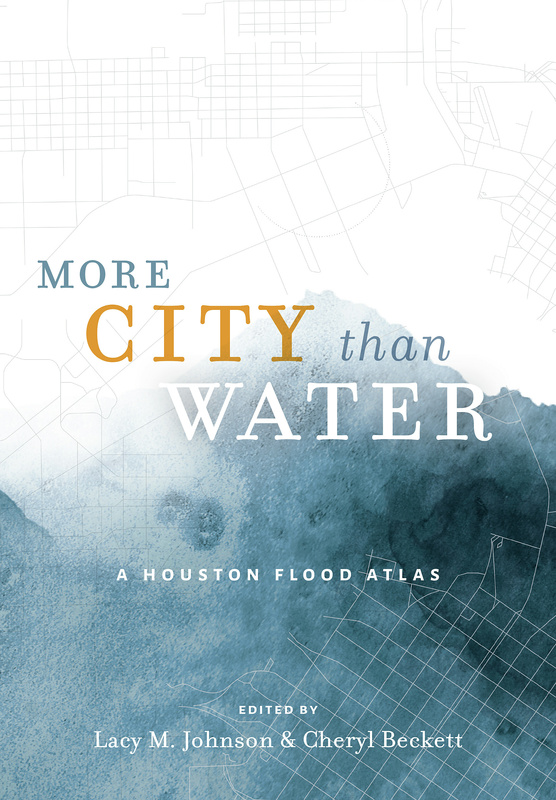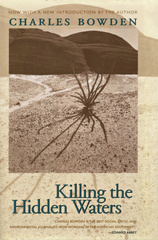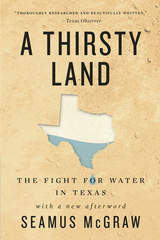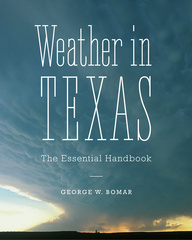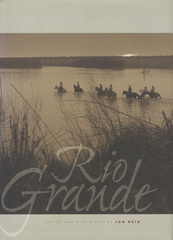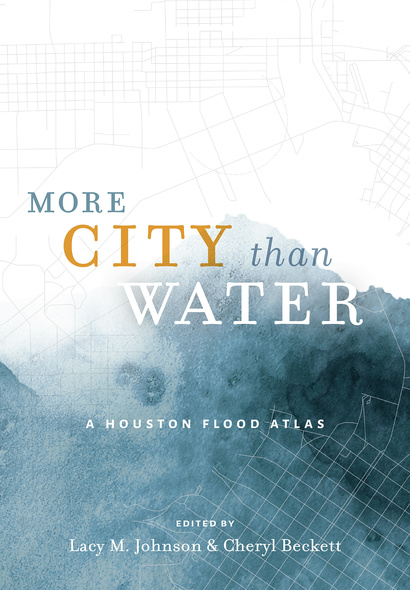
More City than Water
A Houston Flood Atlas
2022 Art in Service to the Environment Award, Sierra Club Lone Star Chapter
Honorable Mention, 2022 Nonfiction Prize, Writers' League of Texas
Writers explore a city’s relationship with chronic catastrophic flooding.
Shortly after Hurricane Harvey dumped a record 61 inches of rain on Houston in 2017, celebrated writer and Bayou City resident Lacy M. Johnson began collecting flood stories. Although these stories attested to the infinite variety of experience in America’s most diverse city, they also pointed to a consistent question: What does catastrophic flooding reveal about this city, and what does it obscure?
More City than Water brings together essays, conversations, and personal narratives from climate scientists, marine ecologists, housing activists, urban planners, artists, poets, and historians as they reflect on the human geography of a region increasingly defined by flooding. Both a literary and a cartographic anthology, More City than Water features striking maps of Houston’s floodplains, waterways, drainage systems, reservoirs, and inundated neighborhoods. Designed by University of Houston seniors from the Graphic Design program, each map, imaginative and precise, shifts our understanding of the flooding, the public’s relationship to it, and the fraught reality of rebuilding. Evocative and unique, this is an atlas that uncovers the changing nature of living where the waters rise.
Houston is the problem and the solution, the dream and the nightmare, the big blue bubble in a still-red state, a global capital for oil production and the most diverse city in the country, a place menaced by future climate catastrophes and the soup bowl into which it already rained sixty-one inches in one storm: 2017’s Hurricane Harvey, which is the particular focus here. Nothing less than this brilliant chorus of writers and mapmakers could capture all that range and contradiction; gathered here, they tell of land and water, inequality and solidarity, possibility and threat. ‘Hurricane Harvey reinforced my belief in the power of water,’ writes marine biologist and native Houstonian Elaine Shen in one of the book’s riveting essays, and More City Than Water reinforces my belief in the power of creative atlases.
I was gripped by More City Than Water from start to finish. If you didn't know how the historic flows of water, wealth, and power have shaped Houston and cities like it around the nation, the maps and narratives here can be your guide. And the book is an affirmation for those who have never been able to ignore the toxic seep industrial capitalism leaves some communities to drown in. It's not an easy book to read, but these pages are as insistent and inescapable as water pouring into the bayou. The words and images in More City Than Water insist on nothing but the truth.
This kaleidoscopic essay collection paints an intimate portrait of Houston, Texas, through multiple, and at times divergent, lenses. Houston is ground zero for three of the twenty-first century's defining phenomena––urban development, extraction, and climate change––and as such it has the power to teach us about how people and communities evolve even as the place that unites them changes irrevocably.
[A] strong anthology...the variety of voices and formats gives the work a sense of breadth. It adds up to a tough, thought-provoking depiction of the wreckage wrought by a changing climate.
[More City Than Water] is beautiful, moving, and, most fundamentally, provocative—a collective portrait of a city defined for good and ill by its relationship to water.
More City Than Water should serve as an inspiration for scholars working in the fields of digital and environmental humanities...This book points the way toward imagining 'environmental citizenship' as an essential practice in communities around the world.
This volume of stories by historians, housing activists, urban planners, climate scientists, marine biologists, poets, artists and longtime residents demonstrate resilience, creativity and even hope.
Excellent.
Never failing their orientation, the band of Houstonians featured in this book eloquently prove the power of the pen by offering a realistic climate poetics. If persistently and repeatedly applied to densely inhabited flood zones, atlases like this one may lead to a global wake-up call whose alarm may even reach the politicians.
What makes the volume cohere so well and become more than the sum of its parts is a shared set of concerns about ‘our relationship to the land, to the future, to flooding, and to one another.
More City Than Water is . . . compelling in many ways. It is academic yet personal, critical yet accessible, local yet global, pessimistic but not cynical, hopeful but not blindly. Its maps are immersive, allowing for extended meditation on existential questions related to human interconnectivity and our collective embeddedness as members of the environment rather than its masters. It will be a worthwhile addition to undergraduate syllabi and, more widely, to all those who care about Houston, climate change, and human rights.
More City Than Water is a beautiful object, beautiful in the way that wrinkles and scars mark skin with truths of a life lived...This is not a book for bystanders. Readers will be implicated, gaining not only critical insights into the infrastructure of one flood-ridden city but also surprising connections to other cities, from Houston to Harlem and to Hermosillo...Listening is only the first step, and the noise of More City Than Water will linger with you long after you close its pages.
Lacy M. Johnson is the author of the essay collection The Reckonings and the memoirs The Other Side and Trespasses. Her writing has appeared in The Best American Essays, The Best American Travel Writing, the New Yorker, and elsewhere. She teaches creative nonfiction at Rice University and is the founding director of the Houston Flood Museum.
Cheryl Beckett is an associate professor and area coordinator at the Kathryn G. McGovern College of the Arts, University of Houston School of Art, Graphic Design Program. Beckett has served as the creative director at Minor Design in Houston since 1987.
- Introduction: More City Than Water (Lacy M. Johnson)
- History
- Gusher (Sonia Hamer)
- History Displaced: Flooding the First Black Municipality in Texas (Aimee VonBokel with Tanya Debose and Alexandria Parson)
- Anthropocene City: Houston as Hyperobject (Roy Scranton)
- If You Didn’t Know Your House Was Sinking (Martha Serpas)
- Meander Belt: A Native Houstonian Reflects on Water (Elaine Shen)
- Ombrophobia (Fear of Rain) (Cheryl Beckett)
- The Task in Front of Us: A Conversation with Raj Mankad (Lacy M. Johnson)
- Memory
- Harvey Alerts (Sonia Del Hierro)
- The Only Thing You Have/Trace of a Trace (Lyric Evans-Hunter)
- Things That Drown, and Why (Bruno Ríos)
- Higher Ground (Bryan Washington)
- The Gallery of Cracked Pavement: A Walking Tour (Dana Kroos)
- The City That Saved Itself (Allyn West)
- We All Breathe the Same Air: A Conversation with P. Grace Tee Lewis (Lacy M. Johnson)
- Community
- Climate Dignity: Reading Baldwin after Harvey and in the Near Northside (Daniel Peña)
- Look East (Susan Rogers)
- Community Power (Ben Hirsch)
- A Whole City on Stilts: Hydraulic Citizenship in Houston (Dominic Boyer)
- Suburban Design with Nature (Geneva Vest)
- Flood Song (Laura August)
- From Ice to Inundation (Cymene Howe)
- Lean into the Living World: A Conversation with Alex Ortiz (Lacy M. Johnson)
- Acknowledgments
- Notes
- Contributors

